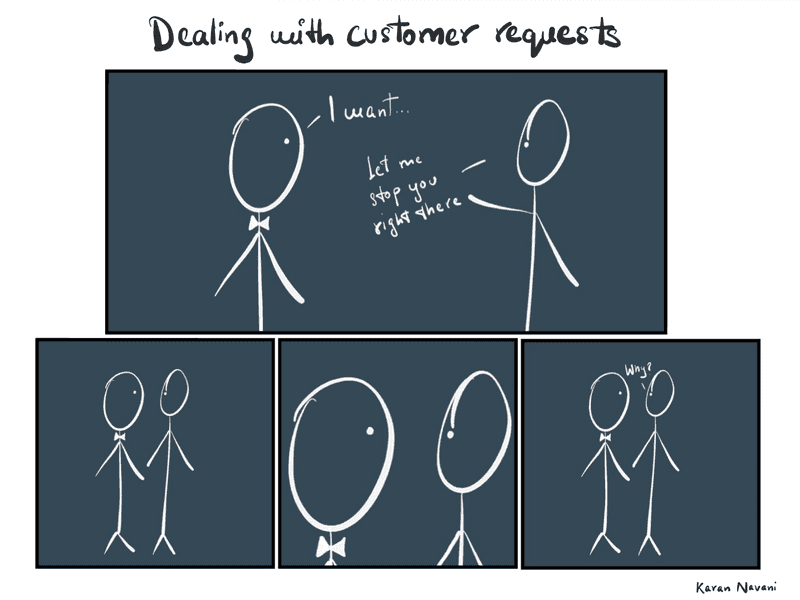Don't Give Your Customers What They Want
June 23, 2019
Do they tell you what they want, what they really really want?
As part of my undergrad dissertation, I interviewed product managers (PMs) from fast-growing startups in London to understand how they innovate. Given the accelerated trajectory of these companies, they are under immense pressure to not only maintain their existing client base but to also expand into new markets. All while trying to stay ahead of the competition.
In this situation, you can imagine how tempting it is to give the customers whatever they ask for, as long as the upside (could be revenue, connections, talent, etc.) outweighs the short term costs and allows them to sustain their astronomical growth ambitions. This seems like the obvious choice, in fact, it might be considered foolish not to do so.
Interestingly, a common theme that emerged from my interviews with the PMs was that they all focused on understanding the “why” of each customer request. They didn’t just ship products/features just because someone asked for it — they dug deeper to understand the task that was trying to be accomplished. This is an important point because many companies who seem to be religiously listening to their customers and meeting their demands fail to be competitive in the long run.
It might seem counterintuitive at first, but this has been widely documented since Clayton Christensen first outlined this as one of his five principles of disruption in the Innovator’s Dilemma.
Principle 1 — Companies depend on customers and investors for resources.
Simply put, this means that companies find it difficult to invest resources in opportunities that do not serve immediate customer demand. This can be due to a plethora of reasons, such as how the value chain of the organisation is configured to turn resources into revenue; or the process a team has to go through to request and justify the allocation of resources to a new effort.
This is incredibly dangerous and notorious because it displays no problematic symptoms until it’s too late. A company that is consistently giving its customers what they want may experience immense success until it is the only way they know how to innovate. Keep this going for long enough, and a new entrant will offer something that your customers never demanded from you because they probably did not know that they needed it.
This brings me to my next point — It is not the customer’s job to know how you can help them do what they want to get done. It is the responsibility of the organisation to decipher what their customers are trying to accomplish. This thinking is popularised by the “Jobs to be Done” framework. The essence of this framework is that you should be designing your offerings around jobs that your customers are trying to perform.
Nothing drives this point home better than the clichéd quote attributed to Henry Ford — “If I had asked people what they wanted, they would have said faster horses.”
Look around and consider why you have ‘hired’ the things around you. Think of the job you are trying to get done and bring that mindset when you are trying to provide an offering to others.
All of this is not to say that your customers’ wants should be blatantly ignored. A good PM tactfully does the delicate dance between listening and understanding the needs of the user and then provides a solution that tackles the fundamental job to be done.
Karan

